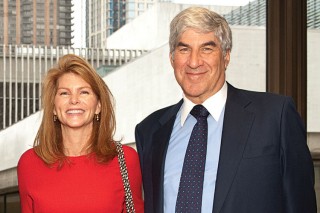Title

Suzie and Bruce Kovner
(Photo by Nan Melville)Juilliard’s chairman, Bruce Kovner, and his wife, Suzie Kovner, a member of the Juilliard Drama Council, made history this fall with the largest single donation ever made to the School: a $60 million gift to establish the Kovner Fellows Program. This new scholarship initiative is intended to attract top young musicians from around the world to Juilliard and will “bring an unprecedented array of talent to New York that will enrich the city for years to come,” he said.
Body
“This extraordinarily generous and visionary gift will ensure that future highly gifted Juilliard musicians will be able to pursue their studies with no financial concerns, freeing them from the heavy debt burden that has caused long-term financial challenges for many students,” said Juilliard’s president, Joseph W. Polisi, upon announcing the gift on October 9. “The Kovners’ support reinforces Juilliard’s commitment to educate future generations of artists who will bring their talents to communities around the world.”
Open to classical music students in the Bachelor of Music, Master of Music, Graduate Diploma, and Artist Diploma programs, the awards will cover the full cost of attendance for approximately 52 students once the program is fully funded. It will maintain this support for the recipients’ entire course of study—the only scholarship program at Juilliard to do so. It will also include an annual professional enrichment stipend for activities such as travel to auditions and competitions, conferences, recordings, and performance opportunities.
The program will also give the fellows access to an exclusive professional network, career-building forums, and an ever-expanding community of Kovner Fellow alumni. Additionally, it will include a unique cultural component that will require fellows to engage with other leading arts institutions in the city and will provide a vibrant, multifaceted program that goes beyond mere scholarship and bring these fellows together in a creative learning community.
Unlike most existing scholarships at Juilliard, the Kovner awards will not be based on financial need; rather, the most important criterion is exceptional artistic merit. Secondary selection factors include successful academic history and intellectual curiosity, commitment to the value of art in society, and potential for leadership in the field. However, since more than 90 percent of Juilliard students typically qualify for needs-based assistance, there will be many cases in which fellows also demonstrate financial need. A portion of the Kovner gift will be allocated to the general scholarship endowment, which will support students across all divisions.
Another significant benefit of this initiative is that Kovner Fellow alumni will be able to start their careers free of debt—an especially important advantage for young artists.
The impact of the Kovner Fellows Program on Juilliard as an institution will be similarly transformational, making a “significant difference in the School’s ability to recruit, admit, and enroll a higher percentage of the top talented students at both the undergraduate and graduate levels,” Joan Warren, Juilliard’s vice president for enrollment management and student development, told The Journal in an e-mail. Thanks to the Kovners’ generosity in structuring the gift so that it can have an immediate impact, the first group of fellows will start benefiting from it next fall.
A founder and retired chairman of Caxton Corporation, one of New York’s most successful trading firms, Kovner, 68, joined Juilliard’s board of trustees in 1995 and was appointed chairman in 2001. Five years after that, he deeply affected the School and the music community with his gift of the Juilliard Manuscript Collection, an extraordinary collection of approximately 140 rarities including lost manuscripts by J. S. Bach, Beethoven, and Stravinsky; the autograph manuscript of the final scene of Mozart’s The Marriage of Figaro; and important manuscripts and first editions of works by Brahms, Copland, Mahler, Schubert, Wagner, and others. Other highlights of his numerous gifts to Juilliard include comprehensive support for the graduate-level Historical Performance program, which Kovner endowed just last year with a $20 million gift, and, earlier this year, a matching grant of up to $5 million that helped raise $10 million for the drama program.




